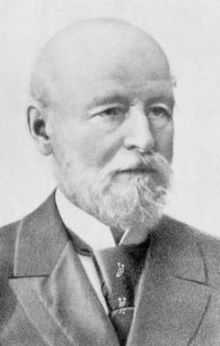Botho zu Eulenburg
| Botho zu Eulenburg | |
|---|---|
 | |
| Botho Graf zu Eulenburg | |
| Interior Minister of Prussia | |
| In office 1878–1881 | |
| In office 1892–1894 | |
| Prime Minister of Prussia | |
| In office 1892–1894 | |
| Monarch | Wilhelm II |
| Personal details | |
| Born | 31 July 1831 Wicken/Bartenstein, East Prussia |
| Died | 5 February 1912 (aged 80) Berlin, Imperial Germany |
| Spouse(s) | Elisabeth von Alvensleben |
| Children | Botho zu Eulenburg (1879–1881) |
| Occupation | Jurist |
| Religion | Lutheran |
Botho Graf zu Eulenburg (31 July 1831 – 5 February 1912) was a Prussian statesman.
Biography
Eulenburg was born in Wicken near Bartenstein[1] to Botho Heinrich zu Eulenburg (1804–1879) and Therese née von Dönhoff (1806–1882).[2] He studied law at the universities of Königsberg and Bonn.
Eulenburg worked in high positions of the Prussian and German administration in Wiesbaden (1869–1872), Metz (president of the Département de la Lorraine; 1872–1873) and upper president of the Province of Hanover (1873–1878). In March 1878 Eulenburg succeeded his first cousin once removed Friedrich Albrecht zu Eulenburg as Minister of the Interior, serving under Bismarck. He implemented a series of repressive anti-socialist measures. From 1881 to 1892 he was the president of the province of Hesse-Nassau.[2]
In 1892, he was appointed Prime Minister of Prussia in succession to Leo von Caprivi, who however remained Chancellor of Germany.
Though Caprivi had recommended the experienced administrator Eulenburg for this appointment, the new prime minister soon made life difficult for Caprivi, and often thought of pressing for his removal. Both Caprivi and Eulenburg were eventually dismissed by Wilhelm II following the renewal of anti-Socialist moves (and an anti-subversion bill) in 1894. Eulenburg often thought of himself as the only possible successor to Caprivi, and he was extremely unhappy to be dismissed at what he regarded as the moment of his destiny. He died in Berlin.
Eulenburg was a second cousin of Prince Philip of Eulenburg, a close friend of Wilhelm II, German Emperor, and an instrumental figure behind the scenes of German politics.
On 25 October 1875 he married at Neustadt, West Prussia Elisabeth von Alvensleben (22 September 1834 in Brandenburg/Havel – 5 September 1919 in Neustadt), by whom he had an only son, Botho (15 February 1879 in Berlin – 30 May 1881 in Berlin).
Notes
Regarding personal names: Graf was a title before 1919, but now is regarded as part of the surname. It is translated as Count. Before the August 1919 abolition of nobility as a legal class, titles preceded the full name when given (Graf Helmuth James von Moltke). Since 1919, these titles, along with any nobiliary prefix (von, zu, etc.), can be used, but are regarded as a dependent part of the surname, and thus come after any given names (Helmuth James Graf von Moltke). Titles and all dependent parts of surnames are ignored in alphabetical sorting. The feminine form is Gräfin.
References
- ↑ Biography at University of Oldenburg
- ↑ 2.0 2.1 Biography at Allgemeine Deutsche Biographie (German)
| Political offices | ||
|---|---|---|
| Preceded by Leo von Caprivi |
Prime Minister of Prussia 1892 – 1894 |
Succeeded by Prince Hohenlohe |
| Preceded by Count Friedrich Albrecht zu Eulenburg |
Interior Minister of Prussia 1878 – 1881 |
Succeeded by Robert von Puttkamer |
| Preceded by Count Ludwig Herrfurt |
Interior Minister of Prussia 1892 – 1894 |
Succeeded by Ernst von Koeller |
| ||||||||
| ||||||||||||||||
|
.jpg)